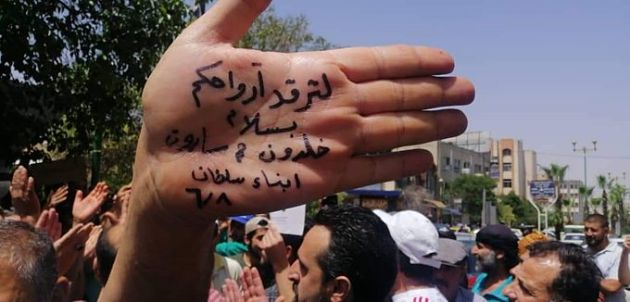In the photo – the inscription on the palm of one of the protesters in Suweida: “The regime must fall.”
While Libya has recently become the epicenter of the geopolitical confrontation in the Greater Middle East, significant events are also taking place in Syria, which has long been involved.
The Assad regime, which was able to win the second stage of the war that began with the full involvement of Iran and Russia, is beginning to lose ground, revealing all its rottenness and incompetence in today’s world. The collapse of the Syrian pound, infighting within the regime’s upper echelons, and new protests in areas under its control are signs of its decay.
Rami Makhlouf, the cousin of the Syrian tyrant and one of the main oligarchs close to the regime (of course, there are no others in such regimes), made a series of statements about his businesses being “confiscated” and asked Bashar al-Assad to intervene. However, the request went unanswered, which is not surprising. The attack on Makhlouf’s business is part of a broader campaign of renewed expropriation of businesses, including those that supported the regime during the war. It is a classic scenario. First, as the feeding trough within the gangs, which undoubtedly includes the Assad regime, dwindles, the struggle for access to it intensifies and “unnecessary mouths” are weeded out (the same thing has happened in Putin’s Russia in recent years). Second, starting with the punishment of outright opponents such as “radicals” and “extremists,” such regimes always end up purging their own ranks.
While disgraced oligarchs have their assets confiscated, ordinary Syrians are losing their livelihoods due to the suffocation caused by the Assad regime and the new package of American sanctions known as the “Caesar Act,” which has led to the collapse of the Syrian pound. Against this backdrop, the protests continue not only in Suweida, where people openly chant anti-regime slogans, but also in Damascus itself, particularly in the Jeramana neighborhood.
In these conditions of peaceful competition, which is essentially a cold war, as is often the case in such cases (FRG and GDR, North and South Korea, etc.), the areas liberated and held by the rebels in northern Syria may begin to appear more attractive to ordinary Syrians than the areas under regime control. This will be facilitated by the active introduction of the Turkish lira as a currency, which, along with other stable foreign currencies, will replace and displace the regime’s worthless money that is no longer needed.
Therefore, as always, the main card of a regime that depends on foreign patrons is war and the transformation of the life of the population in the liberated areas into an unbearable one through new bombings. If Turkey, as the patron of the liberated areas, contributes to the establishment of a peaceful life there, Russia, unable to help Assad in this or to solve its own problems properly, is only capable of bombing the Syrians, which it is starting to do again.
The resumption of the bombings in the liberated areas and the concentration of the regime’s forces in the areas of Jebel al-Zawiya and Jebel al-Akrad indicate its plans to launch a new military operation in Idlib in such a situation. As before, its prospects will depend on Turkey’s position – whether it will help the rebels hold the southern branch of the M4 highway, which the regime is likely to try to cut off, or whether it will agree to hand it over to Moscow as part of a larger deal in the Middle East.
But regardless of the fate of this specific area, the future of Syria as a whole will now be determined elsewhere. It is clear that a relative peace between the regime and the rebels, maintained by the balance of power and the interests of external actors, will exist as long as this balance is maintained. But when it collapses, the Syrian side that manages to create a more effective and attractive political system that Syrians will want to spread throughout the country will have a strategic advantage.

